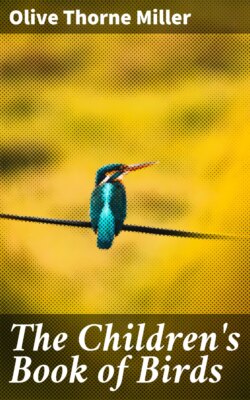Читать книгу The Children's Book of Birds - Olive Thorne Miller - Страница 22
На сайте Литреса книга снята с продажи.
XIII
ОглавлениеTable of Contents
MORE ABOUT HIS FOOD
Some of the big birds work all the time for us. When you see a hawk sitting very still on a dead limb, what do you suppose he is doing?
A good deal of the time he is looking on the ground for a mouse, or a ground squirrel, or a rat, or some creature that he likes to eat.
When he sees one of them move in the grass, he flies down and pounces upon it. Thus he helps the farmer greatly, for all of these little animals destroy crops.
When it grows dark, hawks stop work and go to sleep. Then the owls, who can see better in the dusk, come out of the holes where they have been half sleeping all day. They hunt the same little creatures, most of all rats and mice, which like best to run about in the night.
Perhaps you have heard that hawks and owls carry off chickens. Many people who keep chickens shoot every hawk and owl they see. But if they knew more about them they would not do so. Only two of the common hawks and one owl[1] disturb chickens. All the others kill thousands of the little animals that give the farmers so much trouble.
Owls have a curious way of eating mice. They swallow them whole, and after a while they throw up a queer-looking little ball made of the bones and fur of the mouse.
You may some time have seen a long-legged heron walking about on the seashore or in the salt marsh. Now and then he would thrust his long, sharp bill into something, and lift up his head and swallow. Or you have noticed a little sandpiper running along on the beach or the bank of a river.
The heron was probably eating frogs or fish, and the sandpiper some of the small sea creatures thrown up by the waves. If these were not taken away they would be very bad for us, and perhaps make us sick.
Not less useful to us than these birds are the whole family of finches. The goldfinch in bright yellow coat, the purple finch in red, and the sparrows in plain brown. All of these are fond of seeds as well as insects, and most of all they like the seeds of some weeds that are hard to get rid of.
The goldfinch is called the thistle-bird, because he likes best the seeds of thistles, though he eats the beggar's-ticks too.
The chipping sparrow, the little red-headed bird who comes about our doors, eats the seeds of fox-tail and crab grasses, that spoil our lawns.
The white-throated sparrow, a large and very pretty bird, eats the seeds of smartweed and ragweed. Other finches like bittersweet, sorrel, and amaranth, all of which we are glad to have them eat.
The seed-eating birds can find their food in winter, even when snow covers the ground, because the dead weeds hold on to their seeds, and the snow is not often deep enough to cover them.
Some birds gather their food in the fall, and hide it away where they can find it in winter. Blue jays collect acorns and beech-nuts, and store them in a hole in a tree, or some other safe place, to eat when food is scarce. A woodpecker who lives in the West picks holes in the bark of a tree, and puts an acorn into each one.
The oddest store I know of was made by a woodpecker. He found a long crack in a post, and stuffed it full of live grasshoppers. He did not like dead grasshoppers. He wedged them into the crack so tightly that they could not get out, and I do not know that they wanted to. When grasshoppers were scarce in the fields, he came day after day to his queer storehouse, till he had eaten every one.
One of the woodpecker family who lives in Mexico stores nuts and acorns in the stems of plants. These stems are hollow and made in joints like bamboo. The bird cuts a hole at the upper end of a joint, and stuffs it full. When he wants his nuts, he cuts a hole at the lower end of the joint and pulls them out.
I once had a tame blue jay, who was fond of saving what he could not eat, and putting it safely away. The place he seemed to think most secure was somewhere about me, and he would come slyly around me as I sat at work, and try to hide his treasure about my clothes.
When it was a dried currant or bit of bread, I did not care; but when he came on to my shoulder, and tried to tuck a dead meal worm into my hair or between my lips, or a piece of raw beef under a ruffle or in my ear, I had to decline to be used as a storehouse, much to his grief.
He liked to put away other things as well as food. Matches he seemed to think were made for him to hide. His chosen place for them was between the breadths of matting on the floor.
Once he found a parlor match, hunted up a good opening, and put it in. Then he went on, as he always did, to hammer it down so tightly that it would stay. One of the blows of his hard beak struck the lighting end of the match, and it went off with a sharp crack. The noise and the flame which burst out made the bird jump three feet, and scared him nearly out of his senses.
After that I took care to keep the matches out of the way of a bird so fond of hiding things.
